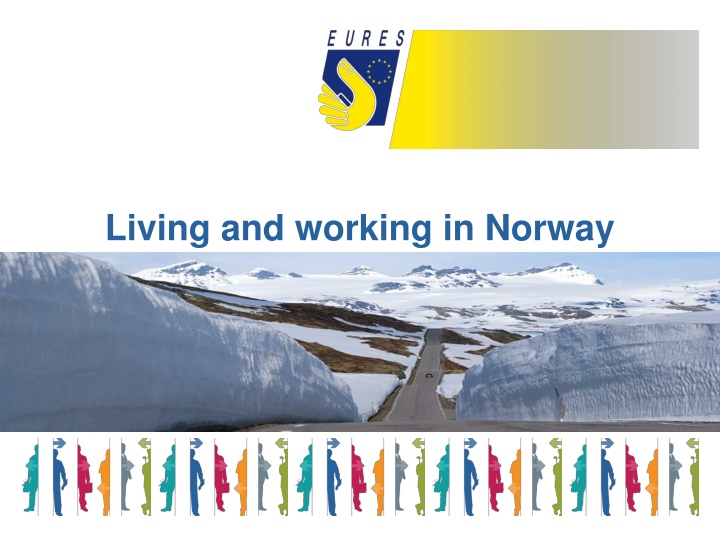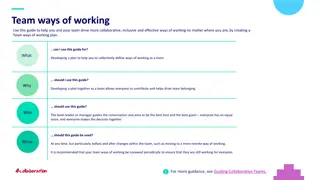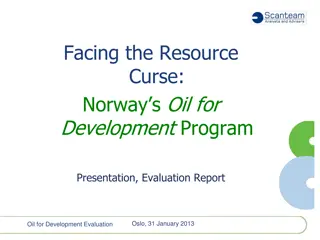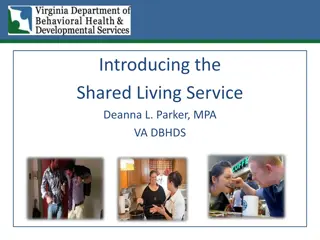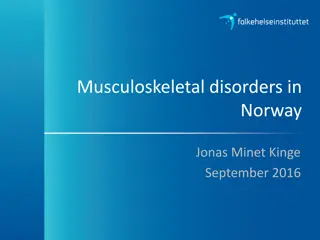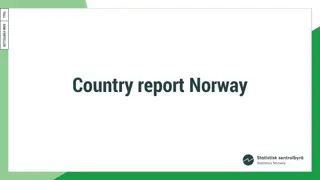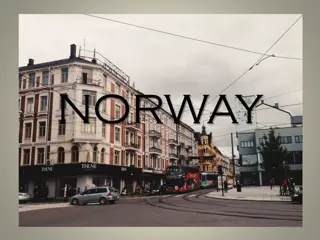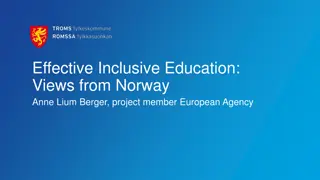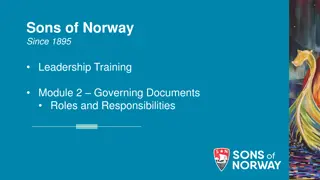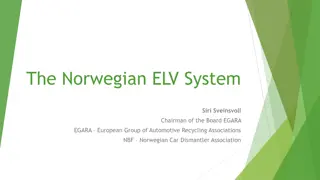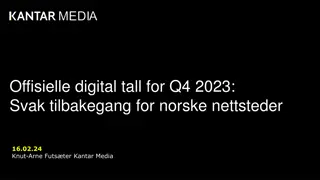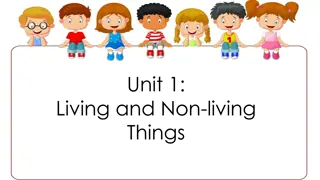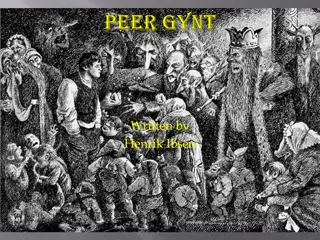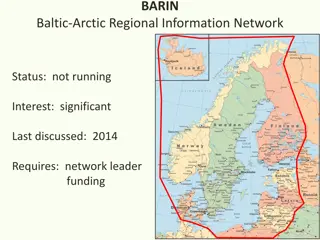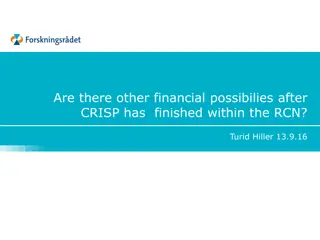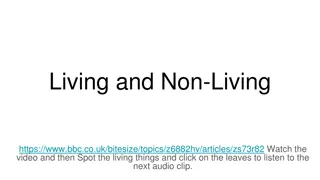Living and Working in Norway - A Comprehensive Guide
"Discover what Norway has to offer in terms of living and working conditions, geography, culture, language, and the labor market. Learn about the unique characteristics of this Scandinavian country and the opportunities it provides for immigrants. Find out about the Norwegian kroner, the constitutional monarchy, and the demand for skilled professionals in various sectors."
Download Presentation

Please find below an Image/Link to download the presentation.
The content on the website is provided AS IS for your information and personal use only. It may not be sold, licensed, or shared on other websites without obtaining consent from the author.If you encounter any issues during the download, it is possible that the publisher has removed the file from their server.
You are allowed to download the files provided on this website for personal or commercial use, subject to the condition that they are used lawfully. All files are the property of their respective owners.
The content on the website is provided AS IS for your information and personal use only. It may not be sold, licensed, or shared on other websites without obtaining consent from the author.
E N D
Presentation Transcript
Norway - up north Length 1750 km 432 km at the widest 6 km at the narrowest Long coastline 7th largest country in Europe 16 persons per km2
Geography Population 5 mill Immigrants 500.000 Capital Oslo 612.000 inhabitants 19 counties Biggest cities: Bergen 250.000 Trondheim 170.000 Stavanger 121.000
Norway Currency: Norwegian kroner - NOK Constitutional monarchy King Harald V and Queen Sonja
Characteristics - 30 to + 30 C Bright summer dark winter Nature variety Outdoor activites Hight standard of living Extensive welfare system Safe working conditions
Language Norwegian or a scandinavian language Norwegian courses in most towns You have to pay for the language course Two official forms. - Standard Norwegian and new Norwegian Close to Swedish and Danish Norwegians speak English well Many regional dialects
Cultur Flat structure in the workplace Conformity/Equality/No special treatment Enjoying space, keeping distance, privacy Cold lunch Dugnad working for free Dress code Importance of nature
Nav EURes www.eures.europa.eu/ - felles europeisk database www.nav.no - jobb i utlandet og i Norge www.eures.no informasjon om jobbe og bo i utlandet
The Labour market in Norway Current situation - 2,7 % unemployment - current supply of vacant positions pr.day approx. 1000 Sector with highest unempolyment - Building and construction (3,7%) - Industry (3,6 %) Sectors with lowest unemployment - Education ( 1,1%) - Engineering and IT (1,2%)
Labour Market shortages/demand Engineers mainly oil & gas IT specialists (with experience) Mechanical Industry (skilled workers) Health sector ( doctors, dentists and specialised nurses) Hotel and tourism (sesonal chefs and waiters) Preschool teachers Construction sector (highly skilled workers only) Transport (bus drivers and long-distance) Agricultural workers (skilled)
Hotel and restaurant A need for chefs and cooks Waiters, headwaiters and barkeepers Biggest need in and around Oslo Mountain and fjord areas also Particularly during summer season Good language skills required
Working conditions Written contract is mandatory 6 months probational period Periode of notice 3 months - 2 weeks during probational period Salary paid one a month Employer draw tax from your monthly pay 37,5 working hours per week Shift workers can have 35,5 hours working week Maximum 40 hours per week Membership in a trade union can be useful
Working conditions Holiday leave is 25 working days per year Holiday pay normally paid out in the month of June Holiday pay 12% of gross pay for trade union members 10,2% for non trade union members Holiday pay is accumulated Labour Inspection Authority: www.arbeidstilsynet.no
Recidence/registration Norway is an EEA (not EU) member EU/EEA citizen have the right to work in Norway from the first day of arrival Job holders must register with UDI (Directorate of Immigration): - register online or the nearest police station or Service Centre for Foreign workers (Oslo, Stavanger, Troms ) Job seekers self-register only when staying longer than 3 months You will also need a National Identification number - Tax office/population register www.skateetaten.no
Taxes Working in Norway for a Norwegian employer, you pay income tax and national insurance contribution in Norway Average income tax is 28% National insurance contribution 7,8% Deductions! EU citizens are entitled to a deduction called standardfradrag in the two first years (10% or max NOK 40.000 per year) House morgage, loans/debts increae your deductions Tax return submitted every year in April
Is Norway expensive? Most Norwegians families have two incomes Income tax is average for Europe Housing is expensive (approx 35-45% of income) Food (except meat) and clothes are not so expensive Alcohol and cigarettes are very expensive Eating out in a restaurant is also expensive One beer will cost about 8 Euro and a glass of wine about 10 Euro in a pub/restaurant. One coffee about 3,5 Euro
Jobbseeking Make a Curriculum Vitae (CV) in English Europass v increasingly common Application letter maximum 1 page Use www.gulesider.no and company web sites On-line CV registration very common Contact employers directly Use your personal network Social media!
Jobbseeking The CV Personalia (name, address etc.) Education Work experience Courses Language skills Interests References (former employer + phone numbers) Photo (not required) 1-2 pages maximum
Useful websites Job related www.nav.no (Labour and Welfare organisation) www.nav.no/eures (Nav Eures Norway) www.eures.europa.eu Study in Norway www.studyinnorway.no www.nokut.no (Recognition of higher education)
Useful web sites New in Norway www.norway.no (Gateway to public sector) www.visitnorway.no (Travel) www.nyinorge.no (New in Norway) Official pages www.skatteetaten.no (Tax card and personal number) www.toll.no ( Customs) www.udi.no ( Work and residence permits, registration) www.mattilsynet.no (Import of animals and plants)
Thank You! Hallgeir Johansen eures@nav.no
